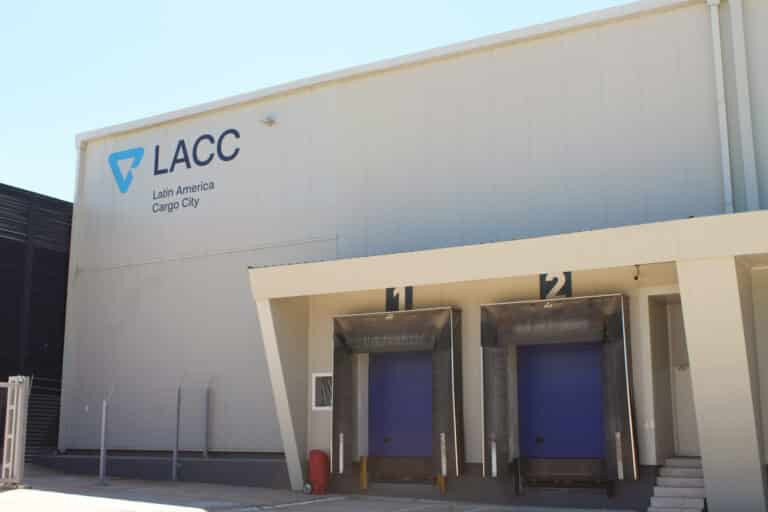Montevideo Free Airport has unveiled its new Latin America Cargo City (LACC) brand, a new business concept that it says will boost trade in the region.
“We are presenting an innovative solution to the market that really seeks to redefine Latam logistics and the way that companies distribute their products in Latin America,” Bruno Guella, managing director at LACC tells ACW.
LACC builds on Montevideo Free Airport’s concept for a multimodal logistics free zone with medical Good Manufacturing Practice (GMP)-compliant infrastructure, client-centred information systems and highly skilled personnel. The airport authority says it is set consolidate its role as the leading distribution platform for the region.
“The Uruguayan government has given us approval to operate the airport until 2053, which allows us to think big and expand what we have been doing up until now,” Guella explains.
“Our MVD Free Airport concept proved that global companies were attracted to the region. Now with LACC we are expanding the first multimodal airport free zone in Latin America, adding an additional 80,000 sq m within the airport premises to host new players and tenants, who can install their own operations here.
“Again, we are thinking globally when it comes to LACC tenants. These will be not only pharmaceutical companies but also e-commerce and technology businesses along with several other verticals that can benefit from our distribution model,” he says.
LACC says it provides a wide range of distribution set-ups designed to meet clients’ specific needs, including pay-per-use storage services, fully integrated conditioning lines or tailored warehouse construction for client-operated models.
“Digital operations are also a key issue for logistics today,” says Guella. “In our new cargo city, we updated our information systems and warehouse management system (WMS), and are also connecting our own system to those of our clients. We are integrating these so work orders can be created for our staff to action the request.”
Guella notes that sustainability is at the heart of the business model and has been important since the airport’s establishment. “We were the first airport in Latin America to generate solar energy, we phased out fossil fuels and all our ground equipment is electric,” he explains. “This is something that as a company, both on the passenger side and cargo side, we are always looking at improving.
“In fact, this year we have plans this year to gain ISO 14001 certification.”
Guella says that LACC is “strategically located” for business. Due to its location inside an international airport, he explains, it offers advantages for all airfreight, in terms of cost efficiency, lead time, tax benefit as well as the ability to handle sea and land freight 24 hours a day, 365 days a year.
Though Uruguay is one of the southern most countries in South America, Guella explains that the airport is a viable trade gateway to the continent.
He says: “We already have companies that are distributing to all of South America from our site. Of course, the quickest markets to access are in the south as not only can we use airfreight but also road freight to Southern Brazil or Argentina.
“In fact, 75% of the region’s GDP is concentrated within a two hour flight of Montevideo.
“It is possible to access Northern markets like Colombia and Venezuela but markets in Paraguay, Chile, Bolivia, Brazil and Argentina are more a focus because they can be accessed by road as well as air.”
A success story
MVD’s vaccine distribution operation was the last to get underway in South America but was a success due to its distribution model, which gained international recognition, says Guella. The model highlighted the benefits of using the Montevideo Airport free zone, especially for pharmaceuticals.
AstraZeneca has already put down roots in Montevideo and runs its distribution operations from LACC to Brazil and Argentina and plans to expand this, Guella explains.
Following this, the airport recently inaugurated a new pharma warehouse, which enhances its current capabilities. Pharma HUB 2 doubles the existing capacity in the +15, +25 and triples the +2 +8 temperature ranges and provides GMP-compliant conditioning areas and premium office space available for client business and administration activities.
Guella also notes that GlaxoSmithKline pharmaceutical company recently confirmed plans to start operations in Uruguay to distribute pharmaceuticals, including vaccines, from the hub to countries in the region.
He adds: “The first pharma warehouse raised awareness with many global pharmaceutical players of the possibilities that MVD’s Airport free zone presented, both for airfreight as well as sea and truck freight, to reach the region safer and more efficiently.
“With the second warehouse we are expanding our scope of services under a GMP environment, including special areas for conditioning services, packaging material sourcing, storing, calibration and assembly, direct-to-patient shipments, amongst others.”
“We have undergone significant growth, have expanded our service offering and client base and were seeking a brand that could fully convey this new positioning.”
Guella concludes: “The Cargo City environment allows for reliable and efficient last-mile distribution, that is fully compliant with good manufacturing and distribution practices, and that enhances synergies within its tenants or clients.
“LACC is redefining Latin American logistics.”




